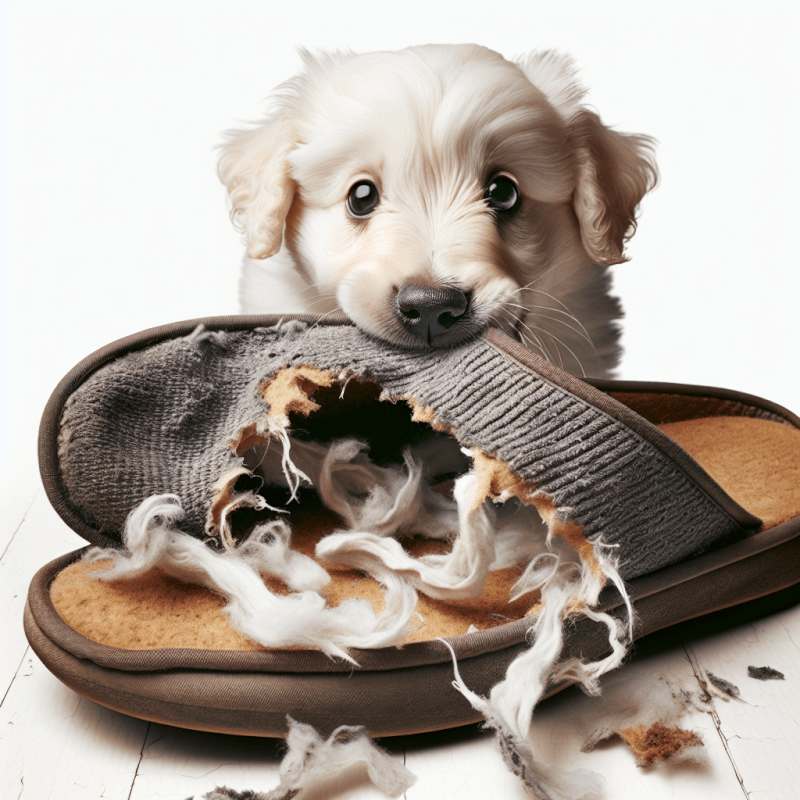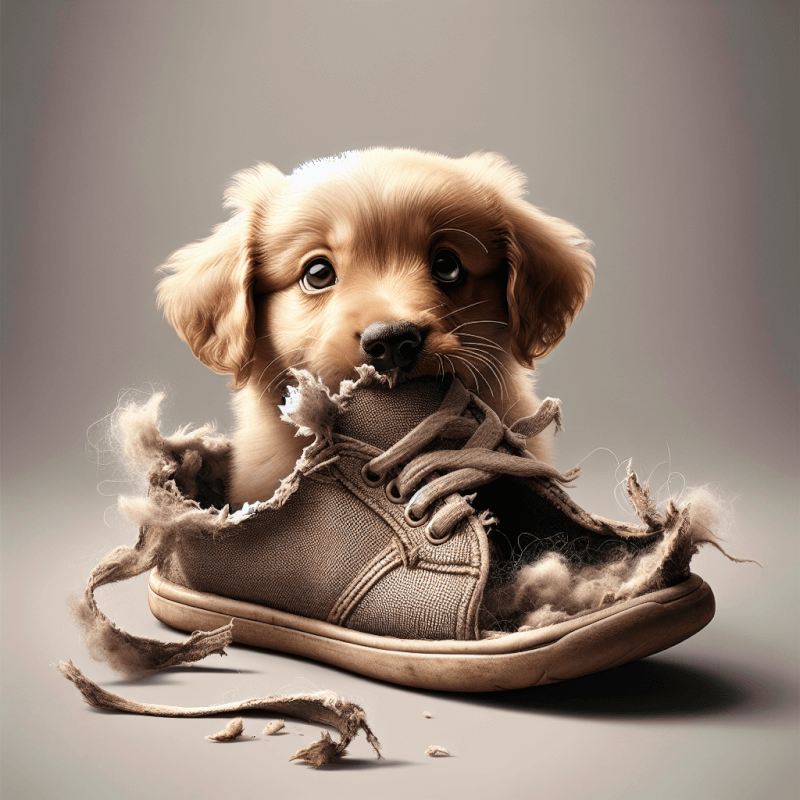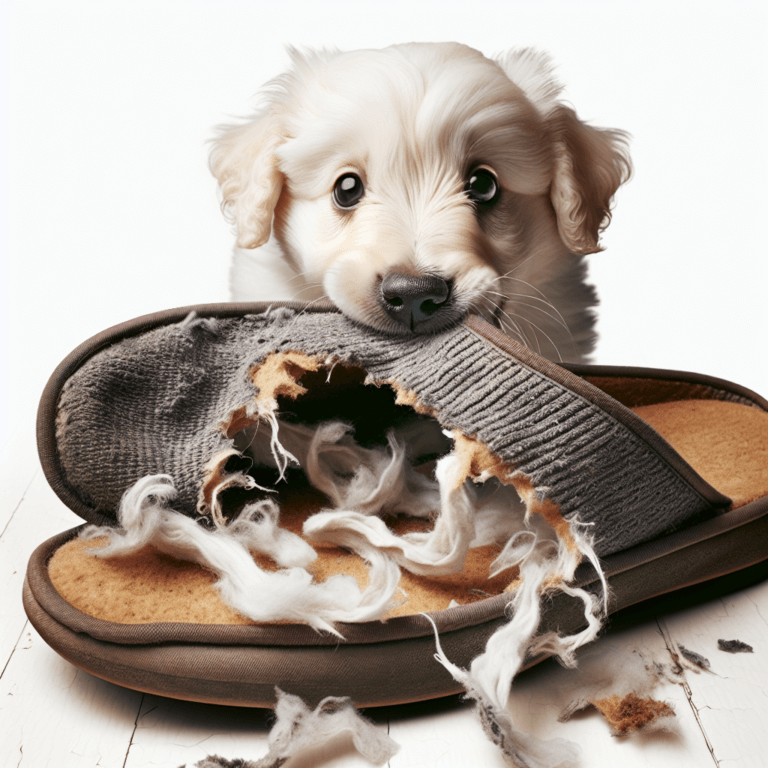Are you a proud new puppy owner, struggling with the challenges of training? Don’t worry, you’re not alone! In this article, we will explore some common bad behaviors that puppies often exhibit during their training journey. From chewing on your favorite shoes to having accidents inside the house, we will provide tips and techniques to help you effectively address these issues and guide your furry friend towards becoming a well-behaved and obedient companion. So, if you’re ready to tackle those puppy training challenges head-on, read on!
Common Bad Behaviors in Puppies
Biting and nipping
One of the most common bad behaviors in puppies is biting and nipping. This behavior is natural for puppies as they explore the world around them using their mouths. However, it is important to address this behavior early on to prevent it from becoming a habit. Teaching your puppy bite inhibition through gentle corrections and redirecting their attention to appropriate toys can help curb this behavior.
Ready for Cat Trivia?
Test your knowledge about cats!

Chewing
Puppies have a natural instinct to chew, but when this behavior becomes destructive or leads to the destruction of valuable items, it becomes a problem. Providing your puppy with appropriate chew toys and discouraging chewing on forbidden objects through consistent redirection and positive reinforcement can help address this behavior.
Jumping on people
Jumping on people is another common bad behavior exhibited by puppies. While it may seem cute when they are small, it can become a nuisance and even potentially dangerous as your puppy grows. Consistent and firm training, coupled with teaching alternative behaviors such as sitting or staying, can help discourage this behavior and promote polite greetings.
Excessive barking
Excessive barking can be a frustrating behavior in puppies. It can be caused by various reasons such as fear, boredom, or seeking attention. Understanding the underlying cause of the barking and addressing it through training methods like desensitization and counter-conditioning can help reduce this behavior and promote a calmer environment.
Digging
Digging is a natural behavior in dogs, but when it becomes excessive or destructive, it can be a problem. Providing your puppy with designated digging areas, ensuring they have enough physical and mental stimulation, and redirecting their attention when they start digging in inappropriate areas can help manage this behavior.
Separation anxiety
Separation anxiety is a common issue in puppies, and it can lead to destructive behaviors and excessive barking when left alone. Gradual desensitization to being alone, using positive reinforcement to create positive associations with alone time, and providing mental stimulation before leaving can help alleviate separation anxiety in puppies.
Aggression
Aggression in puppies can manifest in various ways, such as growling, barking, or biting. It is essential to address aggressive behavior early on, as it can escalate and become a significant concern. Seeking the help of a professional trainer or behaviorist to assess the underlying causes of aggression and implement appropriate training techniques is crucial for managing and modifying this behavior.
House soiling
House soiling is a common problem in puppies and is often a result of incomplete or inconsistent house training. Establishing a consistent routine, using positive reinforcement when your puppy eliminates in the appropriate area, and closely supervising them until they are fully trained can help address this behavior.
Counter surfing
Counter surfing occurs when puppies jump up on countertops or tables to steal food or other items. It is important to prevent this behavior early on to ensure the safety of your puppy and to avoid potential poisoning or accidents. Teaching your puppy the “leave it” and “off” commands, and ensuring that counters are clear of tempting items, can discourage counter surfing behavior.
Stealing
Some puppies have a tendency to steal objects and run off with them. This behavior can be challenging to address as it often stems from boredom or seeking attention. Providing your puppy with plenty of mental and physical stimulation, teaching the “drop it” command, and redirecting their focus onto appropriate toys can help discourage stealing behavior.
Understanding the Causes of Bad Behavior
Age and developmental stages
Puppies go through different developmental stages, and their behavior can be influenced by their age. Understanding the age-related behaviors and challenges that puppies face can help you address their bad behavior more effectively. For example, teething can lead to increased chewing, while adolescence can bring about more independent and stubborn behavior.
Lack of socialization
Proper socialization plays a crucial role in a puppy’s behavior. Lack of early and positive socialization experiences can lead to fear, anxiety, and aggression. It is important to expose your puppy to a variety of people, animals, and environments in a controlled and positive manner to help them develop into well-rounded and confident dogs.
Fear and anxiety
Fear and anxiety can contribute to a wide range of bad behaviors in puppies. Identifying the triggers that cause fear or anxiety in your puppy and gradually exposing them to those triggers in a positive and controlled way can help reduce these behaviors. Additionally, creating a calm and secure environment for your puppy and providing them with outlets for mental and physical stimulation can also help alleviate anxiety.
Boredom and excess energy
Puppies have a lot of energy and can become bored easily. When puppies are not provided with adequate mental and physical stimulation, they may engage in destructive behaviors or exhibit hyperactive behavior. Ensuring that your puppy has outlets for appropriate exercise, play, and mental stimulation can prevent boredom-related bad behaviors.
Lack of proper training
Proper training is crucial in preventing and addressing bad behavior in puppies. Without clear instructions and consistent reinforcement of desired behaviors, puppies may develop bad habits. Investing time and effort into positive reinforcement training methods can help promote good behavior and prevent the development of bad habits.
Health problems
Sometimes, bad behavior in puppies can be a result of underlying health issues. Pain, discomfort, or illness can cause changes in behavior. It is important to rule out any medical conditions through regular veterinary check-ups and consult with your veterinarian if you suspect that your puppy’s behavior is influenced by a health problem.

The Importance of Early Training and Socialization
Socialization with other puppies/dogs
Early socialization with other puppies and dogs is crucial for the development of appropriate social skills in puppies. It provides them with opportunities to learn proper play behavior, communication skills, and appropriate ways to interact with other dogs. Enrolling your puppy in puppy socialization classes or arranging playdates with other well-vaccinated and friendly dogs can help foster positive social interactions.
Positive reinforcement training
Positive reinforcement training is a highly effective method for teaching and reinforcing desired behaviors in puppies. By rewarding your puppy for demonstrating good behavior, such as sitting or walking nicely on a leash, you can encourage them to repeat those behaviors. Using treats, praise, and affection as rewards can create a positive association with training and promote a strong bond between you and your puppy.
Consistency and structure
Consistency and structure are essential for effective training. Dogs thrive on routines and clear expectations. Establishing consistent rules and boundaries from the beginning and sticking to them will help your puppy understand what is expected of them. Consistency also applies to reinforcement of good behavior and addressing bad behavior promptly and consistently.
Encouraging good behavior
Rather than focusing solely on correcting bad behavior, it is important to proactively encourage and reinforce good behavior in your puppy. Praising and rewarding your puppy when they display desired behaviors, such as going potty outside or calmly greeting visitors, will help solidify those behaviors and make them more likely to occur in the future.
Redirecting and managing bad behavior
Redirecting and managing bad behavior is a crucial part of puppy training. Instead of scolding or punishing your puppy for engaging in unwanted behavior, redirect their attention to a more appropriate behavior or activity. For example, if your puppy is chewing on furniture, redirect them to a chew toy. Managing bad behavior involves setting up the environment to prevent opportunities for the behavior to occur, such as using baby gates to limit access to forbidden areas.
Effective Techniques to Address Bad Behavior
Positive reinforcement and reward-based training
Positive reinforcement and reward-based training methods are highly effective in addressing bad behavior in puppies. By rewarding desired behaviors with treats, praise, and affection, you can motivate your puppy to repeat those behaviors. Conversely, avoiding punishment-based methods or harsh corrections will help maintain a positive and trusting relationship with your puppy.
Desensitization and counter-conditioning
Desensitization and counter-conditioning techniques can be used to address fear and anxiety-related behaviors in puppies. These techniques involve gradually exposing your puppy to the triggers that cause fear or anxiety in a controlled and positive way. By pairing the trigger with something enjoyable, such as treats or play, you can help your puppy develop positive associations and reduce their negative response to the trigger.
Ignoring and time-outs
Ignoring unwanted behaviors and using time-outs can be effective methods to discourage bad behavior in puppies, particularly behaviors seeking attention. When your puppy engages in an unwanted behavior, such as jumping or excessive barking, ignore them by turning away, crossing your arms, and not giving any verbal or physical attention. You can also use time-outs by briefly removing your puppy from the situation or from your presence. This helps teach them that engaging in the unwanted behavior leads to a loss of attention and rewards.
Using deterrents or deterrent devices
Deterrents or deterrent devices can be used to discourage certain behaviors, such as chewing on furniture or jumping on counters. These can include bitter-tasting sprays applied to forbidden objects or using motion-activated devices that emit a harmless spray or sound when your puppy engages in the unwanted behavior. Consistently using deterrents can help your puppy associate the behavior with an unpleasant consequence, leading them to avoid it.
Establishing a routine and setting boundaries
Establishing a routine and setting boundaries is important for addressing and preventing bad behavior. Having a consistent schedule for meals, potty breaks, playtime, and training sessions helps your puppy understand what is expected of them and reduces anxiety. Setting clear boundaries, such as not allowing your puppy on the furniture or establishing specific areas for play and rest, helps prevent confusion and ensures a structured environment for your puppy.

Potential Pitfalls in Puppy Training
Inadequate or inconsistent training
Inadequate or inconsistent training can hinder the progress of addressing bad behavior in puppies. Training should be a consistent and ongoing process that requires time and effort. Failing to dedicate enough time and consistency to training sessions can lead to slow progress or even the development of more ingrained bad habits. It is important to commit to regular training sessions and follow through with consistent reinforcement of desired behaviors.
Using punishment-based methods
Using punishment-based methods can have negative consequences on your puppy’s behavior and overall well-being. Harsh corrections or physical punishment can create fear and aggression in puppies, eroding trust and damaging the bond between you and your puppy. It is important to focus on positive reinforcement and reward-based training methods to address bad behavior effectively.
Skipping socialization
Skipping or neglecting socialization in puppies can lead to behavioral problems later on. Early socialization experiences are crucial for puppies to learn appropriate behaviors and develop good social skills. Failing to provide positive and controlled socialization opportunities can result in fear, aggression, and anxiety-related behaviors. It is essential to prioritize early socialization to set your puppy up for success.
Neglecting exercise and mental stimulation
Insufficient exercise and mental stimulation can contribute to the development of bad behavior in puppies. Puppies have high energy levels and need plenty of physical and mental outlets to expend their energy. Neglecting to provide adequate exercise and mental stimulation can result in boredom, excess energy, and the manifestation of unwanted behaviors. Regular play sessions, walks, and interactive toys can help keep your puppy engaged and prevent the development of behavioral problems.
Not addressing underlying health issues
Some bad behavior in puppies can be rooted in underlying health issues. Pain, discomfort, or illness can cause changes in behavior, leading to unwanted behaviors. It is important to monitor your puppy’s health and seek veterinary attention if you notice any significant changes in behavior. Addressing any underlying health issues can help alleviate the associated behavioral problems.
Seeking Professional Help
Understanding when to consult a professional trainer or behaviorist
Sometimes, addressing bad behavior in puppies may require the assistance of a professional trainer or behaviorist. If your efforts to address the behavior have been unsuccessful or if the behavior is severe or escalating, it is important to seek the guidance of a professional. Professional trainers and behaviorists have the experience and knowledge to assess the underlying causes of the behavior and provide an appropriate training plan.
Finding a qualified trainer or behaviorist
When looking for a qualified trainer or behaviorist, it is important to do thorough research. Look for professionals who have experience and expertise in working with puppies and addressing behavior issues. Ask for recommendations from veterinarians or trusted sources, and consider reading reviews or testimonials to gauge the effectiveness of their methods. A qualified trainer or behaviorist will prioritize the use of positive reinforcement and reward-based training methods.
Evaluating training methods and philosophy
Before working with a professional trainer or behaviorist, it is important to evaluate their training methods and philosophy. Ensure that their approach aligns with your values and that they prioritize the use of humane and ethical training techniques. It is essential to choose a professional who focuses on positive reinforcement and avoids punishment-based methods.
Working together with a professional
Collaboration with a professional trainer or behaviorist is key to addressing bad behavior effectively. Be open and transparent about your puppy’s behavior and provide as much information as possible to help the professional assess the situation. Follow their guidance and be consistent in implementing the training plan. Remember that addressing bad behavior takes time and effort, and working together with a professional will increase the chances of success.

Preventing Future Bad Behavior
Continued reinforcement of good behavior
Preventing future bad behavior involves continued reinforcement of good behavior. Once your puppy has learned and consistently displays desired behaviors, it is important to continue to reinforce and reward those behaviors. Regular training sessions, praise, and positive reinforcement will help maintain good behavior and prevent regression.
Ongoing socialization and exposure
Ongoing socialization and exposure to different environments, people, and animals is important for preventing future bad behavior. Continue to provide positive and controlled socialization experiences for your puppy to ensure they develop confidence and good social skills. Regular exposure to various stimuli will help your puppy become well-rounded and adaptable.
Providing mental and physical stimulation
Preventing bad behavior in puppies requires providing them with adequate mental and physical stimulation. Engage your puppy in regular play sessions, provide puzzle toys or interactive feeders, and incorporate training exercises into their daily routine. Mental and physical stimulation helps prevent boredom and reduces the likelihood of developing unwanted behaviors.
Regular veterinary check-ups
Regular veterinary check-ups are essential for the overall health and well-being of your puppy. Regular examinations can help identify any underlying health issues that may contribute to behavioral problems. It is important to follow your veterinarian’s recommendations for vaccinations, deworming, and preventive healthcare to ensure your puppy is in optimal health.
Establishing consistent rules and boundaries
Consistency in establishing and maintaining rules and boundaries is crucial for preventing future bad behavior. Clearly communicate your expectations to your puppy and consistently reinforce desired behaviors while redirecting or redirecting unwanted behaviors. By providing guidelines and structure, you will help your puppy understand what is allowed and what is not, reducing the chance of developing bad habits.
Dealing with Specific Bad Behaviors
Biting and nipping
To address biting and nipping, it is important to teach your puppy bite inhibition. This involves redirecting their attention to appropriate toys when they start to bite or nip and discouraging rough play. Consistency and patience are key, and avoiding any rough physical play or encouraging biting with your hands will help them understand what is acceptable behavior.
Chewing
To discourage destructive chewing, provide your puppy with appropriate chew toys and praise them when they chew on those toys. If your puppy starts chewing on furniture or other forbidden objects, redirect their attention to the appropriate toy. Consistency is key, and ensuring that your puppy has plenty of mental and physical stimulation will help reduce excessive chewing.
Jumping on people
To discourage jumping on people, teach your puppy alternative behaviors such as sitting or staying. Consistently reward and praise your puppy when they greet people politely or remain calm. Avoid reinforcing the jumping behavior by not giving any attention while they are jumping. With consistency and positive reinforcement, your puppy will learn that polite greetings are more rewarding.
Excessive barking
To address excessive barking, it is important to identify the triggers that cause your puppy to bark excessively. Gradually expose your puppy to those triggers in a controlled and positive way, rewarding calm behavior. Consistency in redirecting their attention to more appropriate behaviors and desensitizing them to the triggers will help reduce excessive barking over time.
Digging
To manage digging behavior, provide your puppy with a designated digging area where they can satisfy their natural urge. Encourage them to dig in that area by burying treats or toys, and provide plenty of mental and physical stimulation to prevent boredom. If they start digging in inappropriate areas, redirect their attention to the designated area and praise them when they dig there.
Separation anxiety
Addressing separation anxiety requires gradual desensitization to being alone. Start by leaving your puppy alone for short periods and gradually increase the duration. Create positive associations with alone time by providing treats or toys that they only have access to during those times. Avoid making a big fuss when leaving or arriving home to help normalize their alone time.
Aggression
Dealing with aggression in puppies requires professional help from a qualified trainer or behaviorist. Aggressive behavior can be complex and potentially dangerous, so it is essential to seek guidance from an experienced professional who can assess the underlying causes and develop an appropriate training plan.
House soiling
To address house soiling, establish a consistent routine for potty breaks and reward your puppy when they eliminate outside. Supervise your puppy closely indoors, and if you catch them in the act of eliminating inside, calmly interrupt them and immediately take them outside to finish. Avoid punishment or scolding, as this can cause fear or anxiety. Consistency in reinforcement and closely monitoring their behavior will help them understand where it is appropriate to eliminate.
Counter surfing
To discourage counter surfing, teach your puppy the “leave it” and “off” commands. Consistently reward and praise them for not engaging in the behavior, and avoid leaving tempting items within their reach. Additionally, ensure that your puppy has appropriate alternative activities and outlets for mental and physical stimulation to prevent boredom-related counter surfing.
Stealing
To discourage stealing behavior, redirect your puppy’s attention to appropriate toys or activities whenever they start stealing objects. Engage them in interactive play or provide puzzle toys to keep them mentally stimulated. Consistency in teaching and reinforcing the “drop it” command will also help discourage stealing behavior.

Consistency and Patience in Training
Understanding that training takes time and effort
It is important to understand that training takes time and effort. Addressing bad behavior in puppies requires consistency, patience, and repetition. Every puppy is different, and progress may vary. By committing to regular training sessions and remaining patient throughout the process, you will see gradual improvements over time.
Importance of repetition and reinforcement
Repetition and reinforcement are key to effective training. Puppies learn through repetition, so consistent practice of desired behaviors is essential. Additionally, reinforcement through praise, treats, and affection increases the likelihood of a behavior being repeated. Consistently reinforcing and rewarding good behavior will help solidify those behaviors and make them more likely to occur in the future.
Being patient and avoiding frustration
Training can sometimes be frustrating, especially when dealing with persistent bad behaviors. It is important to remain patient and avoid expressing frustration or anger towards your puppy. Dogs can sense your emotions, and negative emotions can hinder the training process. Take breaks when needed, practice self-care, and approach training sessions with a calm and positive mindset.
Celebrating progress and small victories
Celebrating progress and small victories is an important part of training. Recognize and praise your puppy for their achievements, no matter how small. Acknowledging their efforts and progress will not only motivate your puppy but also reinforce the positive bond between you. Gradually building on these small victories will lead to more significant behavioral improvements.
Conclusion
Addressing and preventing bad behavior in puppies requires understanding the common causes and implementing effective training techniques. By focusing on positive reinforcement, consistency, and proper socialization, you can help your puppy develop into a well-behaved and happy companion. Remember that training takes time and effort, but with patience and dedication, you can guide your puppy towards a lifetime of good behavior. Seek professional help when needed and continue to reinforce positive behavior to ensure a harmonious relationship with your furry friend.



